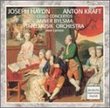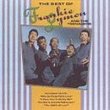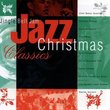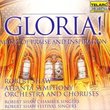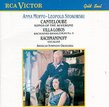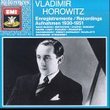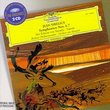| All Artists: Franz Joseph Haydn, L'Archibudelli Title: Haydn: The Last 3 String Quartets Members Wishing: 0 Total Copies: 0 Label: Sony Release Date: 5/20/1997 Genre: Classical Styles: Chamber Music, Historical Periods, Classical (c.1770-1830) Number of Discs: 1 SwapaCD Credits: 1 UPC: 074646273128 |
Search - Franz Joseph Haydn, L'Archibudelli :: Haydn: The Last 3 String Quartets
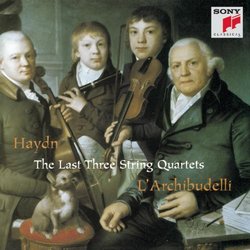 | Franz Joseph Haydn, L'Archibudelli Haydn: The Last 3 String Quartets Genre: Classical
|
Larger Image |
CD DetailsSimilarly Requested CDs
|
CD ReviewsHaydn, the Modernist 11/16/2001 (4 out of 5 stars) "Well, this may be going a little far, but of course many of Haydn's late compositions point their way forward. The choral writing in his late oratorios and masses showed Beethoven the way in his two masses, especially the Missa Solemnis. And then Haydn's symphonies used novel devices that propelled all of High Classical symphonic writing: the use of motives, rather than whole melodies, that gave symphonic fast movements great concision and motoric thrust.In the world of the string quartet, too, Haydn, not Mozart, is the model for Bethoven and Schubert--even Schumann. The first of the Op. 77 quartets tells you why. Though called a minuet still, the third movement is a genuine scherzo of Beethovenian stripe, and the last movement, with its perpetuum mobile codetta, sounds very much like the more Dionysiac passages in Beethoven's quartets. (The wonderful last movement of the of Op. 59, No. 3, comes to mind immediately.)Here is a chance to examine this side of Haydn in two quartets that show him still at the height of his powers. Even the Op. 103, which Haydn couldn't complete because of failing health, has a strangely menacing-sounding minuet that takes us into a darker part of the soul than the Classical era almost ever explored.These performances are very fine indeed, though note that they employ period instruments. If the Kodaly or Lindsay Quartet is your paradigm in Haydn, you may be disappointed by the lack of vibrato and the steelier tone that gut strings impart. That said, these are models of period performance practice, with a fleetness in the faster movements and a sober, dry-eyed approach to the more inward music that sounds just right for this late 18th-century music. The inclusion of the transcription of Haydn's song about growing old adds an especially apt note to the proceedings, given that Op. 103 was Haydn's farewell to music." Revelatory picea mariana | Brooklyn, NY United States | 12/05/2005 (5 out of 5 stars) "Listening to this recording profoundly deepened my appreciation and understanding of Haydn's accomplishment. Haydn developed the string quartet form and in these late works we hear it brought to perfection. Here is the foundation for Beethoven's great quartets. L'Achibudelli's "period" approach makes the structure of these pieces apparent, while still retaining the warmth and pathos of the music. The playing is extrordinary, the color and tempos are just right, and the recording quality is superb. If you have any interest in string quartets or Haydn (or both) this CD is essential." Essential listening. Luca | San Francisco, CA USA | 09/13/2003 (5 out of 5 stars) "IMHO this is historic: the finest record of any string quartets by anybody ever made. Stretch? Listen to how the phrases dovetail tonally from part to part, how the figures flow so easily on gut strings, the glorious viola sound, utterly unlike the dull modern sound, the relaxed energy and effortless blend of identities of it all. This is truly a best guess as to what pre-industrial classical quartets really sounded like. Check out Immerseel's Anima Eterna group doing Schubert for the closest orchestral comparison."
|

 Track Listings (11) - Disc #1
Track Listings (11) - Disc #1